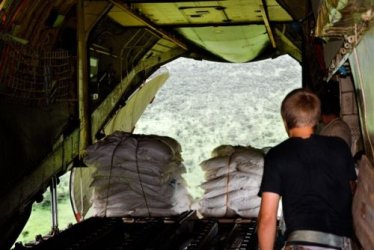UN provides meals to twice as many schools in Unity state this year
By Bonifacio Taban Kuich
May 3, 2013 (BENTIU) – The World Food Programme (WFP) is providing an increasing number of meals to schools in South Sudan’s Unity state as food shortages and malnutrition worsened in some areas.

Out of 312 schools, 97 were selected for this year’s feeding program, according to officials from Unity state’s ministry of education. This is a significant increase from the 40 schools which received food last year. As the rainy season approaches more roads will be inaccessible preventing food supplies from reaching remote areas in various nine counties of the state.
Angelo Chol Dongway, the minister of general education in Unity says he had a successful meeting with WFP to offer more school feeding programs in order to attract higher enrollment.
The WFP however, has placed some preconditions before releasing more food school meals, the minister said.
“In our meeting with WFP in Unity state, we discussed issues related to schools feeding and agreed that they will supply schools with food in order to encourage the enrollments. In addition to that they said that they will also help in the renovation of some schools so that they will fulfill all the requirements….including that each school should have storage, kitchen and toilets or latrines”, said Dongway.
Minister Dongway told Sudan Tribune on Friday that the programs will start soon before raining season begins in a few weeks.
“Last year the number was less than these ones, the number of target schools, but this year there are new ones according to the criteria of WFP. We want them to be ready”, Dongway said.
WFP has been distributing and delivering food to some schools in South Sudan, but there are concerns that not all the food reaches the people it is intended for. This is why Minister Dongway said they are working to recommend some ingenious organizations to monitor and distribute food to the approved schools centers.
“What are we going to do? We are going to give these to community-based-organizations and these community organizations should be recommended by the Ministry of Education to make sure that the organizations are capable of distributing the foods to their locations. So what we will do is monitor through the community base organizations that are going to distribute the food and in addition to our education offices in the counties they will monitor also together with commissioners in all the counties”, added the minister.
A report from the Famine Early Warning System Network on 1 May said that between April and September acute food security will worsen “as the lean season progresses due to high food prices, reduced income, and persistent insecurity that continually disrupt livelihoods of the affected population”.
The report said that the “prices of staple foods continue to be high as households increase reliance on markets. Prices of most commodities are above five-year averages and will peak during the seasonal lean period between May and July. Although trade is expected to improve between Sudan and South Sudan, poor households are not expected to reap immediate benefits”.
Unity state which borders Sudan has been impacted by restrictions on cross border trade. Other border communities in Northern Bahr el Ghazal, Warrap, and Upper Nile have also been affected.
However, the improved relations between the two nations has led the resumption of oil production and the establishment of border crossing points is expected to have a positive impact on the economies and access to food on either side of the world’s newest country’s international border.
(ST)
